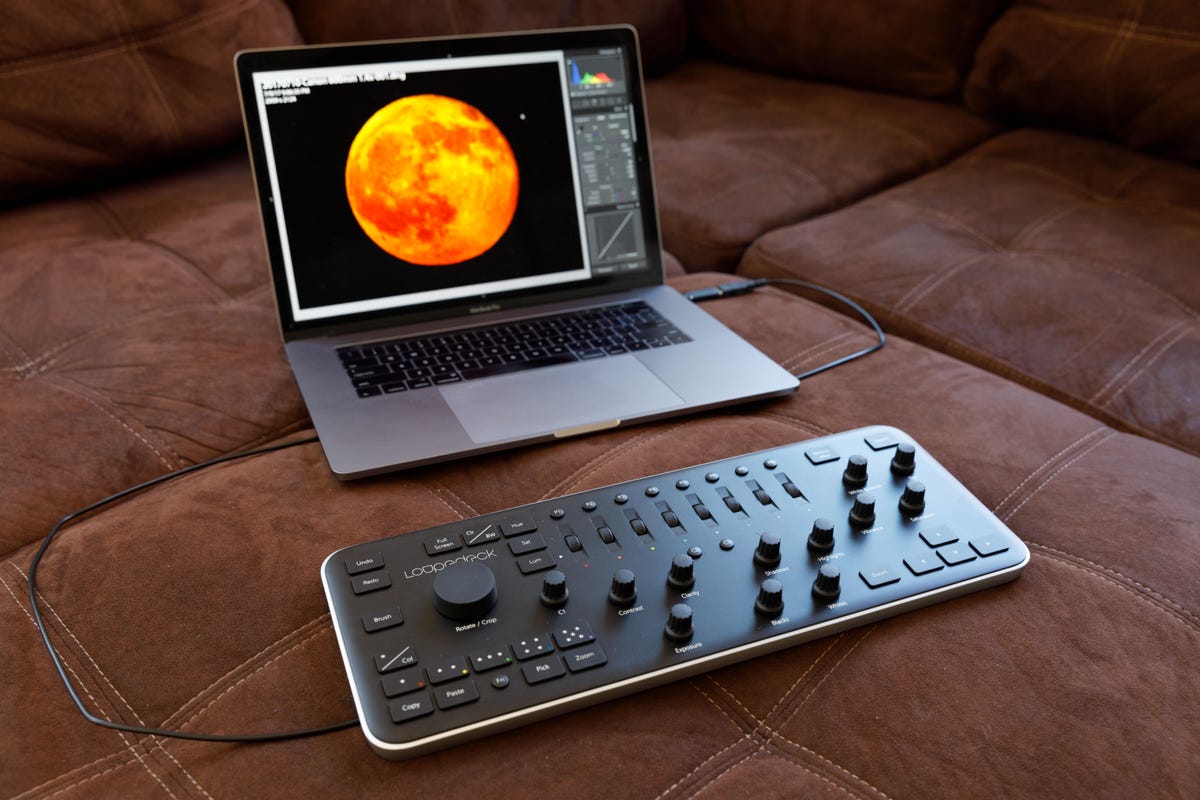 Why You Can Trust CNET
Why You Can Trust CNET Loupedeck review: Loupedeck brings an analog touch to Lightroom
This console can help make your photo editing a more physical, intuitive process.
When I first got my hands on the Loupedeck console for Adobe Lightroom CC Classic, I expected the big benefit would be that its knobs and buttons would speed up my photo editing.
The Good
The Bad
The Bottom Line
Nope.
The Loupedeck is indeed a bit faster, though I'm already pretty fast after spending a decade with the adjustment sliders in Adobe Lightroom. Instead, what I liked most about the $300 Loupedeck (£249 or AU$429) is that it inspires a more freewheeling editing style. Instead of thinking something like "Let's go +0.33 on exposure, then -20 on highlights," I'll fiddle with the knobs until things look right without looking at the numbers.
It's a refreshingly analog style of editing. In my case, it helped me break away from some standard editing recipes that, while useful, can leave me stuck in a rut.
The Loupedeck isn't cheap, and it isn't perfect. But if you're a photo enthusiast who spends a lot of time editing photos at your desk, it's definitely useful.
I wouldn't expect beginners to buy a Loupedeck. That's unfortunate, because it reveals features and encourages experimentation in a way that I imagine would make it easier to scale Lightroom's learning curve. Instead, it's for pros and enthusiasts who spend a lot time editing photos, whether light editing for lots of shots or detailed adjustments to a few favorites.
The Loupedeck design is well thought-out, with the most important knobs centrally located and other functions in sensible groups. The knobs change settings at just the right rate, though that's adjustable if you find them too pokey or too twitchy. If you want to start fresh, you can zero out an adjustment fast by pushing down on the knob. It fits comfortably on your lap.

The Loupedeck editing console brings physical controls to Adobe Lightroom.
A custom adjustment knob can be configured with a few options. I set it to control Lightroom's dehaze function, and when used in combination with the Loupedeck's Fn button, for vignetting. Two custom buttons open some other options, too.
Still, I have a few complaints. The Loupedeck buttons are too mushy for my taste. The giant knob for rotating and cropping photos isn't an improvement to traditional Lightroom controls. Nothing is illuminated, so working in the dark is hard. There's no Bluetooth connection, so you'll often be plugging and unplugging the Loupedeck from your laptop when you come and go. The Mac software has some rough edges, though several problems have been ironed out, and I'd like to control the vignetting in Lightroom's lens-correction panel, not just one in the effects panel.
Even with custom editing hardware, don't expect to step totally away from the keyboard and mouse. You'll still need your old-school tools for tasks like keywording, cropping, various keyboard shortcuts and synchronizing a subset of editing changes from one photo to others.
For me, Loupedeck is best with Lightroom's develop module, but it also works with the library module. There, you can arrow-key your way through a new batch of photos, giving them star ratings and color tags, flagging them as picks or rejects, and applying the Lightroom or custom presets assigned to Loupedeck's preset buttons. Except for the preset buttons, though, I didn't find Loupedeck any better than Lightroom's regular library-mode keyboard shortcuts.
The biggest risk for Loupedeck is that Lightroom's features could drift out of sync with the Loupedeck hardware. Adobe added its dehaze adjustment recently, changed how the clarity feature works, and could very well change other features in the future.
Lightroom's custom knob and buttons can help keep it current, of course, but bigger changes are possible, too. For example, Loupedeck only works with Adobe's Lightroom Classic CC, not the new Lightroom CC version that today has no support for software plug-ins like the one Loupedeck uses.
But the power users for whom Loupedeck is suitable aren't likely to embrace Lightroom CC any time soon. For today's Lightroom, Loupedeck is a useful tool.


